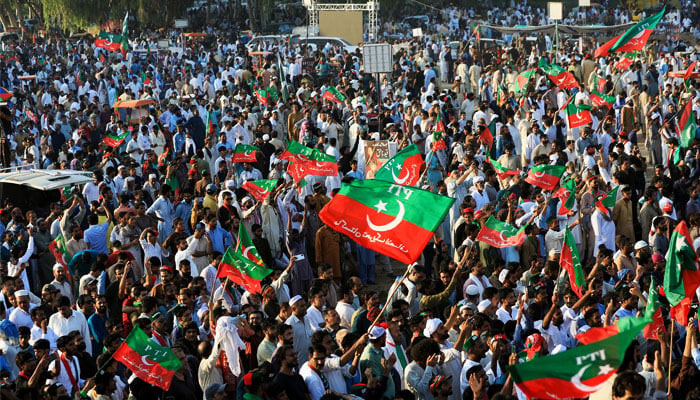The new normal
Imran Khan has said that even martial laws of Generals Ziaul Haq and Pervez Musharraf were better than today’s democratic setup
In a startling declaration, PTI founder Imran Khan has said that even the martial laws of Generals Ziaul Haq and Pervez Musharraf were better than today’s democratic setup. His words, meant as a critique of what critics call the current ‘hybrid regime’, do find some takers who point out that democracy in the country, once a rallying cry and symbol of resistance against authoritarianism, has now become a hollow shell. Observers have noted that this comparison may not be entirely without merit – though with important caveats. General Zia’s era was a dark chapter in Pakistan’s history, marked by a comprehensive assault on political, social, and civil rights. His regime didn’t just target political dissent; it reshaped the very fabric of Pakistani society, promoting religious extremism, nurturing a Kalashnikov culture, and entrenching the seeds of intolerance. It was a time when women’s rights, minority rights, and human rights were all mercilessly trampled under the weight of his draconian policies. This is why perhaps nothing can be compared to General Zia’s martial law.
Today’s Pakistan faces its own set of grave challenges – a creeping encroachment on fundamental rights through internet bans, a chilling attempt at creating an online firewall, and the passing of anti-democratic legislation. Little is done to mask the undercurrents of control and censorship that are once again pervasive. This system may not be new in Pakistan’s long history of power struggles, but it has certainly evolved into something disturbingly permanent. The most alarming aspect of this evolution is the role political parties have played. Today’s political forces seem to be content with merely jostling for their turn to benefit from the very framework that diminishes democracy. It is also tragic to see how political parties that survived Zia’s and Musharraf’s martial laws are now willing participants in the erosion of the democracy they once championed. In fact, each government – PTI in 2018, PDM in 2022 and PDM in 2024 – has ceded more space, weakening democracy with each step.
This new normal reflects a fundamental shift in Pakistan’s political culture. No longer is there an urgent call for dialogue or a collective effort to restore democratic principles. Instead, the grand political dialogue that seems so noble on paper is a mere fantasy. And the reality is much bleaker: there is no room for meaningful dialogue when political parties are preoccupied with waiting for their turn in power through backroom deals rather than through free and fair elections. Lip service is paid to democratic ideals, but actions reveal a collective abdication of responsibility. Political parties have willingly given up on ensuring that the people’s vote counts, that elections are fair, and that power is earned through legitimacy rather than through the machinations of invisible hands. The tragedy is that Pakistan’s democracy, which survived assassinations, coups, and the violent repression of its leaders, is now fading – because those entrusted with safeguarding it have simply stopped fighting.
-
 ChatGPT Caricature Prompts Are Going Viral. Here’s List You Must Try
ChatGPT Caricature Prompts Are Going Viral. Here’s List You Must Try -
 James Pearce Jr. Arrested In Florida After Alleged Domestic Dispute, Falcons Respond
James Pearce Jr. Arrested In Florida After Alleged Domestic Dispute, Falcons Respond -
 Cavaliers Vs Kings: James Harden Shines Late In Cleveland Debut Win
Cavaliers Vs Kings: James Harden Shines Late In Cleveland Debut Win -
 2026 Winter Olympics Snowboarding: Su Yiming Wins Bronze And Completes Medal Set
2026 Winter Olympics Snowboarding: Su Yiming Wins Bronze And Completes Medal Set -
 Trump Hosts Honduran President Nasry Asfura At Mar-a-Lago To Discuss Trade, Security
Trump Hosts Honduran President Nasry Asfura At Mar-a-Lago To Discuss Trade, Security -
 Cuba-Canada Travel Advisory Raises Concerns As Visitor Numbers Decline
Cuba-Canada Travel Advisory Raises Concerns As Visitor Numbers Decline -
 Anthropic Buys 'Super Bowl' Ads To Slam OpenAI’s ChatGPT Ad Strategy
Anthropic Buys 'Super Bowl' Ads To Slam OpenAI’s ChatGPT Ad Strategy -
 Prevent Cancer With These Simple Lifestyle Changes
Prevent Cancer With These Simple Lifestyle Changes -
 Air Canada Flight Diverted St John's With 368 Passengers After Onboard Incident
Air Canada Flight Diverted St John's With 368 Passengers After Onboard Incident -
 Experts Reveal Keto Diet As Key To Treating Depression
Experts Reveal Keto Diet As Key To Treating Depression -
 Inter Miami Vs Barcelona SC Recap As Messi Shines With Goal And Assist
Inter Miami Vs Barcelona SC Recap As Messi Shines With Goal And Assist -
 David Beckham Pays Tribute To Estranged Son Brooklyn Amid Ongoing Family Rift
David Beckham Pays Tribute To Estranged Son Brooklyn Amid Ongoing Family Rift -
 Jailton Almeida Speaks Out After UFC Controversy And Short Notice Fight Booking
Jailton Almeida Speaks Out After UFC Controversy And Short Notice Fight Booking -
 Extreme Cold Warning Issued As Blizzard Hits Southern Ontario Including Toronto
Extreme Cold Warning Issued As Blizzard Hits Southern Ontario Including Toronto -
 Lana Del Rey Announces New Single Co-written With Husband Jeremy Dufrene
Lana Del Rey Announces New Single Co-written With Husband Jeremy Dufrene -
 Ukraine-Russia Talks Heat Up As Zelenskyy Warns Of US Pressure Before Elections
Ukraine-Russia Talks Heat Up As Zelenskyy Warns Of US Pressure Before Elections




